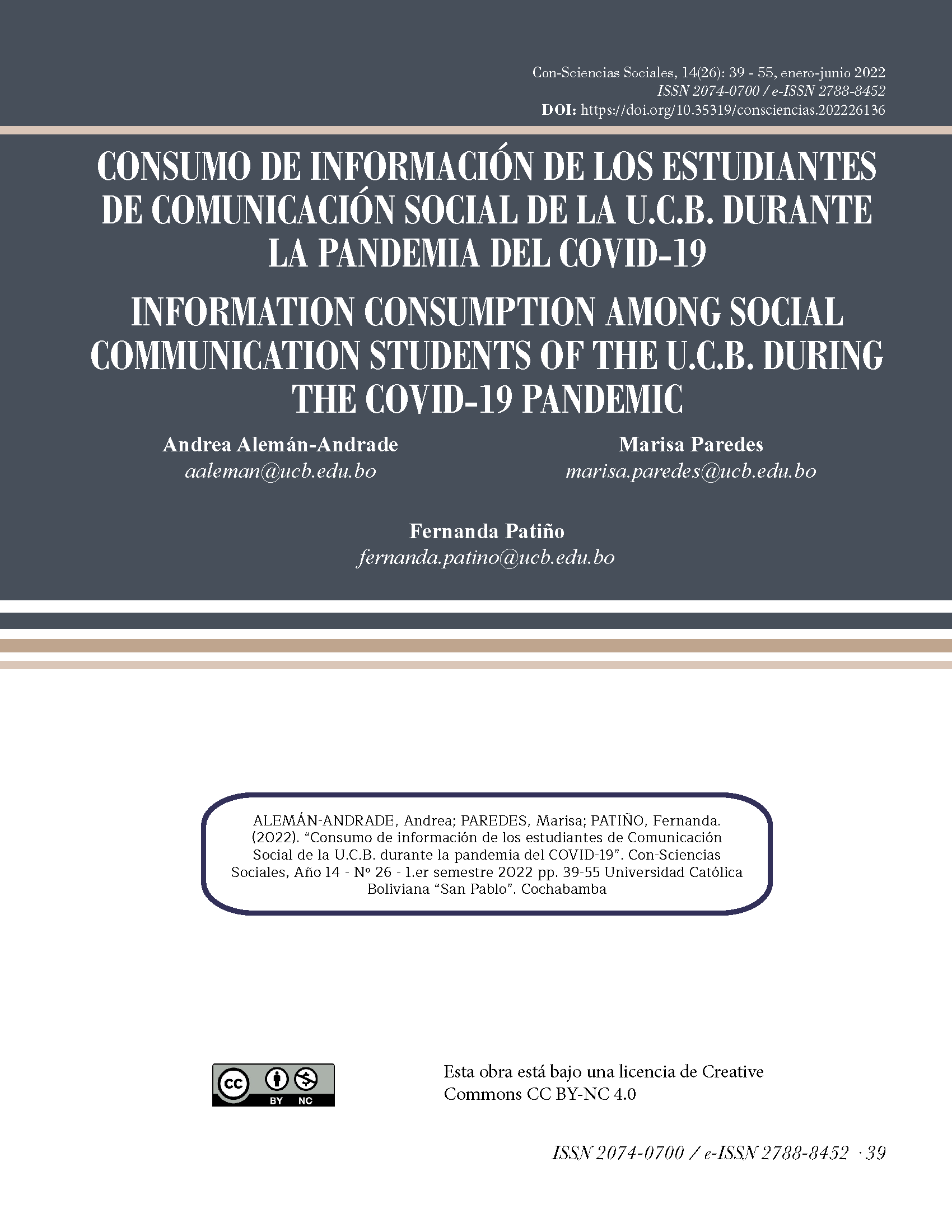Information consumption among social communication students of the U.C.B. during the COVID-19 pandemic
DOI:
https://doi.org/10.35319/consciencias.202226136Keywords:
information, consumption, pandemic, students, communicationAbstract
With the unexpected rigid lockdown that lasted more than two months due to the pandemic in Bolivia, Information and Communication Technologies, among them digital social networks, were the only windows for information and interaction. This research aims to analyze the information consumption regarding the coronavirus pandemic among Social Communication students of Universidad Católica Boliviana “San Pablo” during the strict quarantine of 2020. In order to do this, a mixed methodology was used. As a main finding, young people’s reliance towards information produced by television and digitized newspapers was detected compared to the information coming from digital social networks. The existence of fake news caused feelings of anguish, anxiety and tiredness, but a critical consumption towards them was evidenced.
Downloads
References
Alemán-Andrade, A., & Jiménez, C. (2021). Guía de consideraciones éticas de investigación social y de Comunicación. Universidad Católica Boliviana «San Pablo». https://cba.ucb.edu.bo/wp-content/uploads/2019/12/Guia-etica-investigacion-social-y-Comunicacion_Aleman-y-Jimenez.pdf
Ávila, E. (2020). Los nuevos ecosistemas mediáticos y las nuevas narrativas: Una oportunidad para el periodismo trasmedia y crossmedia en Bolivia. Revista Punto Cero, 40, 75-88. DOI: https://doi.org/10.35319/puntocero.20204016
El Deber. (2020a, abril). “Sin periódicos no hay democracia”: La ANP demanda la atención del Gobierno ante la crisis que pone en riesgo miles de empleos. El Deber. https://eldeber.com.bo/pais/sin-periodicos-no-hay-democracia-la-anp-demanda-la-atencion-del-gobierno-ante-la-crisis-que-pone-en-_175734
El Deber. (2020b, mayo 13). El papel periódico no transmite el Covid-19. El Deber. https://eldeber.com.bo/tendencias/el-papel-periodico-no-transmite-el-covid-19_176671
Hernández, J. (2020). Impacto de la COVID-19 sobre la salud mental de las personas. Medicent Electron, 3(24), 578-594.
Hernández, R., Fernández, C., & Baptista, P. (2014). Metodología de la investigación (6ta ed.). McGraw Hill Interamericana.
Horton, R. (2020). Offline: COVID-19 is not a pandemic. The Lancet, 396 (10255), 874. https://doi.org/10.1016/S0140-6736(20)32000-6 DOI: https://doi.org/10.1016/S0140-6736(20)32000-6
Lesta, M. L., Ortega Villafañe, M., Rodríguez, A. P., & Torres, C. R. (2015). Imaginario y tecnologías digitales: El sueño del receptor activo. En Las humanidades digitales desde Argentina. Tecnologías, culturas, saberes. Actas de las I Jornadas de Humanidades Digitales (pp. 248-256). Universidad de Buenos Aires. http://aahd.com.ar/sites/default/files/novedades/adjuntos/Actas%20HD%202014.pdf
López, P. L. (2004). POBLACIÓN MUESTRA Y MUESTREO. Punto Cero, 09 (08), 69-74.
Maranto, M., & González, M. E. (2015). Fuentes de información. Universidad Autónoma del Estado de Hidalgo. https://repository.uaeh.edu.mx/bitstream/bitstream/handle/123456789/16700/LECT132.pdf
March Cerdà, J. C. (2020). La COVID-19 y las fuentes de información fiables para una mejor salud mental. Revista de Enfermería y Salud Mental, 16, 3-5. https://doi.org/10.5538/2385-703X.2020.16.3 DOI: https://doi.org/10.5538/2385-703X.2020.16.3
Ojeda, A. (2016). Las redes sociales: De medios de comunicación a espacios sociales. Traspatios, 4, 109-124.

Published
How to Cite
Issue
Section
License
Copyright (c) 2022 Revista Con-Sciencias Sociales

This work is licensed under a Creative Commons Attribution-NonCommercial 4.0 International License.









